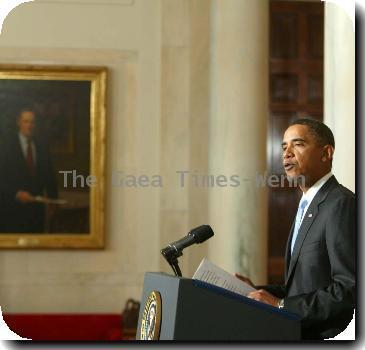US, UN officials see hope for turning Copenhagen deal into binding treaty
By John Heilprin, APThursday, January 14, 2010
US, UN officials see hope for binding climate deal
UNITED NATIONS — The nonbinding Copenhagen Accord is at a critical moment that will decide whether it becomes a mandatory treaty for cutting greenhouse gases, the top U.S. climate official said Thursday.
It will only happen, Todd Stern told a gathering of Wall Street leaders and investors, if the “major players” provide the United Nations by the end of January with their promised plans for reducing carbon emissions by 2020.
“We have an accord that’s kind of lumbering down the runway, and we need it to get enough speed so it can take off,” Stern said. “The best way to make progress toward a legal agreement is to get the Copenhagen Accord implemented.”
Stern, the U.S. State Department’s special envoy for climate change, struck a hopeful note about the uncertain outcome of the U.N. climate conference in the Danish capital in December, in his first public remarks since returning from Copenhagen.
The Copenhagen agreement fell short on specific steps to cool the planet, but urged deeper cuts in emissions of carbon dioxide and other gases blamed for warming the globe. It also set up the first significant program of climate aid to poorer nations and adopted a goal of holding the rise in global temperatures below 2 degrees Celsius. A $30 billion fund over the next three years, scaling up to $100 billion a year by 2020, was a key element.
But a U.N. draft document showed emissions cuts pledged at U.N. climate talks would put the world on “an unsustainable pathway” toward average global warming 50 percent higher than industrial countries want. The document forecast the average global temperature would rise in coming decades by 3 degrees Celsius compared to pre-industrial levels. The world has already warmed a bit, so that would mean an additional 2.3 degrees Celsius warming from the present day.
The last-minute deal emerged principally from President Barack Obama’s meeting with Chinese Premier Wen Jiabao and the leaders of India, Brazil and South Africa. Afterward, it was put to the entire 193-nation meeting for adoption, but the accord was merely “noted” in the end by most of the world’s nations.
“We now need to have countries step forward and say, ‘I want to be part of it,’ ” Stern told the high-profile business crowd, which collectively controls some $13 trillion in assets. “The best way to make progress toward an ultimate legal agreement is to get this Copenhagen Accord implemented.”
The focus of the U.N. gathering Thursday was on using investors’ financial assets to encourage the use of cleaner energy sources and fuels.
Stern said no one should underestimate the importance of what he called “a breach in the firewall between developed and developing countries. What happened here was that, for the first time, major developing countries … have agreed to list the specific actions that they’re going to take to mitigate, to reduce their emissions.”
Robert Orr, a U.N. assistant secretary-general for policy, said many investors asked him at a dinner Wednesday night about the jumbled result of an exhausting negotiating marathon to end the Copenhagen conference.
“I heard the word, when discussing Copenhagen, “disorienting,” ”confusing,” and it might as well have been a thesaurus of words that meanly roughly the same thing,” Orr said. But that’s understandable, he said, because the Copenhagen climate talks were “the biggest, most complex and arguably the most consequential negotiation ever held in human history.”
Orr said that since the conference “a process has been put in place that all nations now can associate themselves with the accord.”
“I think it’s safe to expect that a very large number of countries will be doing so,” he added. “That will give us a very strong basis to pursue the treaty, legally binding negotiation, in 2010.”
The U.N. aims to turn the Copenhagen Accord into a binding treaty at a climate conference in Mexico City scheduled to be held between Nov. 29 and Dec. 10.
Tags: Barack Obama, Climate, Copenhagen, Denmark, Environmental Concerns, Environmental Policy, Europe, Events, International Agreements, North America, United Nations, United Nations Climate Change Conference 2009, United States, Western Europe

